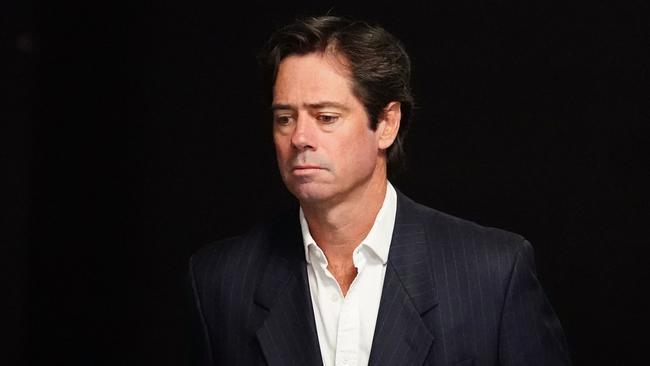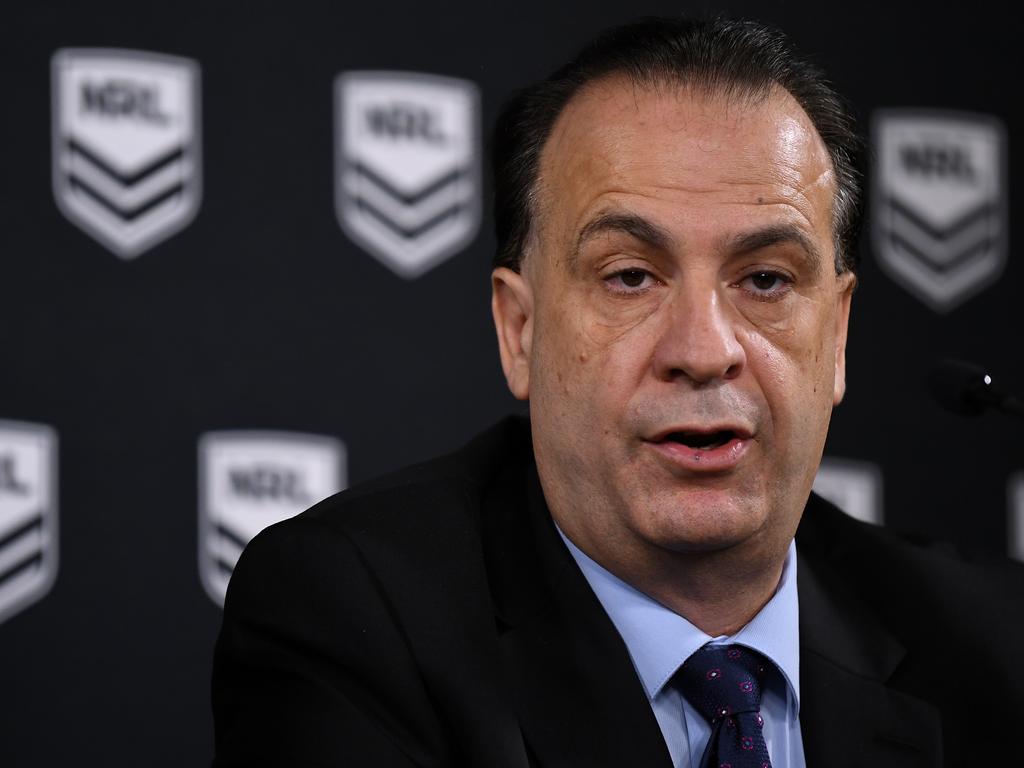AFL faces its greatest threat ever
Massive cost-cutting program underway at AFL clubs as season put on hold due to virus.

A massive cost-cutting program is under way at AFL clubs as football faces what league chief executive Gillon McLachlan described as its greatest threat ever.
The AFL Commission decided on Sunday to suspend the 2020 season until June in the face of the coronavirus crisis, with McLachlan conceding there was no certainty play would recommence at the start of winter.
The challenges facing the AFL are unprecedented and multi-dimensional as the league seeks to ensure the survival of all clubs by the time the worst of the pandemic has passed.
Every AFL executive in Australia, be it in league headquarters or at club level, is mindful of the dire economic implications caused by the crisis.
Another nationwide hook-up occurred on Sunday as the remaining three matches of the opening round of the competition played out to empty stadiums.
Hawthorn and Brisbane footballers hunted the Sherrin on the MCG unaware the season had been temporarily suspended as a drained McLachlan described his despair.
The AFL and some teams had already begun laying off employees heading into the weekend amid the prospect that clubs would need to cut up to $10m from their budgets.
Some sides have already placed non-essential staff members on forms of leave, with further measures to be unveiled this week.
The decision of some state governments to close borders, among other drastic measures, effectively forced the AFL to suspend the season.
The commission debated the decision to start the season last week long and hard and had similarly intense discussions ahead of Sunday’s decision. McLachlan believes the AFL made the right call last Wednesday and again on Sunday in light of the medical and government advice it received.

The AFLW season has also been abandoned just three matches out from a premier being decided.
Because the competition is conference-based, the commission decided a flag could not be fairly awarded to any of the four remaining clubs.
It is clearly a blow for North Melbourne, Carlton and Melbourne, which posted semi-final wins on the weekend.
But spare an additional thought for the Fremantle women, who were unbeaten and seeking to secure the club its first premiership of any kind.
McLachlan said he could never have imagined a day that an AFL season would be suspended, though administrators have been working frantically over the past fortnight on it becoming a reality.
“To say this is the most serious threat to our game in 100 years is an understatement,” McLachlan said.
“It is unprecedented in its impact. It is unprecedented in the impact it is having on our game and the wider community, and as a community and as a code, we all need to take the unprecedented and required actions to get through this together.”
A senior AFL administrator said on Thursday the solvency of even the biggest Victorian clubs would be in question by the time the crisis was over. Port Adelaide chairman David Koch said clubs could be lost to the competition if “we don’t handle this well”.
“It is that serious, but let me tell you every single club and the AFL, what has been achieved in the last 10 days is fricking remarkable,” he told 3AW.
Hawthorn president Jeff Kennett said the league made “the only viable decision”, but warned, “it will have enormous ramifications on all components of the AFL”.
McLachlan conceded the competition faced a drastic challenge. But he said stimulus measures for small businesses announced on Sunday by federal Treasurer Josh Frydenberg “gave some comfort”.
“We’re working collectively to secure liquidity so that we protect the AFL and all our 18 clubs. That’s what we have been working on over the last week or so,” he said.
“We’ll do what we need to do to survive as an industry and we will do what we need to do to look after everybody’s health and wellbeing across the community.”
It is believed football clubs will send their players away from training for at least a month.
The AFL Players Association is still working on how the crisis will affect the wages of members, with footballers asked to take a 20 per cent cut. AFLPA chief executive Paul Marsh advised it was an “incredibly uncertain and stressful time for all players”.
The league will reassess in late April and McLachlan stressed the AFL would play into summer, if necessary, to complete an abridged 17-round season.





To join the conversation, please log in. Don't have an account? Register
Join the conversation, you are commenting as Logout